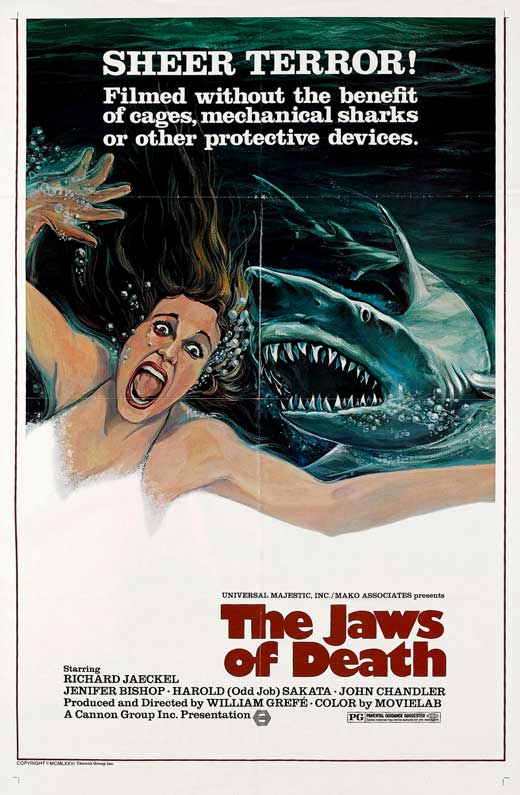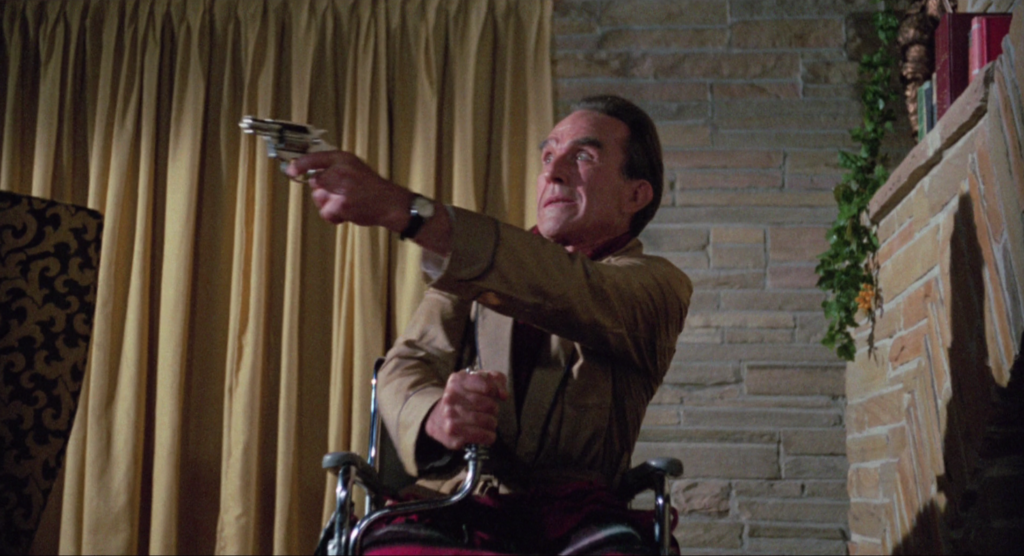
The third disc in Arrow Video’s He Came from the Swamp: The William Grefé Collection matches a reconstructed director’s cut of Grefé’s druggy, campy melodrama The Naked Zoo (1970) with one of his best known grindhouse efforts, the sharksploitation feature Mako: Jaws of Death (1976). (I’ve previously offered looks at the first two discs in the box set: Sting of Death/Death Curse of Tartu and The Hooked Generation/The Psychedelic Priest.) Perhaps The Naked Zoo might have been better paired with The Hooked Generation, because it’s another attempt to graft a somewhat confused portrait of the counterculture onto a more traditional genre thriller. Steve Oliver, who had appeared in the TV series Peyton Place as well as Angels from Hell (1968) and Russ Meyer’s Motorpsycho (1965), plays a young writer in Miami hungry for success as a novelist while lording over small hippie gatherings and acting the boy toy for aging socialites. He’s a swinger, as the movie poster puts it, partaking in free love which is treated as the kind of harem fantasy familiar from countless youth exploitation films of the late 60’s. The parties Oliver’s character attends look like a cross between a B-movie beatnik club and the deliciously phony happenings of Meyer’s Beyond the Valley of the Dolls (1970), where the scantily clad dance on tables to live music and caricatures engage in various bits of lustful or zonked-out comic business. Pills are popped, dope is smoked, hard liquor is poured by the gallon, and living room bonfires are merrily initiated.
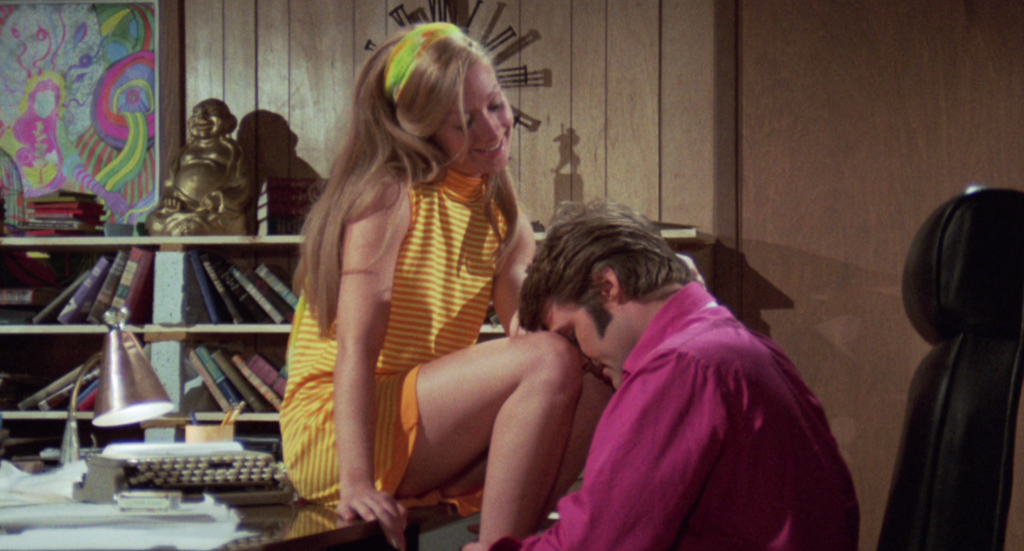
Womanizing writer Terry Shaw (Steve Oliver) in The Naked Zoo.
But Oliver’s character, Terry Shaw, is also self-loathing, amoral and destructive, setting him on a dark path as he becomes mixed up with one Mrs. Golden, played by “The Love Goddess” herself, 52-year-old Rita Hayworth. When the wheelchair-bound Mr. Golden (Ford Rainey) catches the two of them locking lips, he immediately produces a gun and begins firing. (Terry jumps and tumbles over and under the furniture to avoid the incoming fire.) During the chaotic conflict, Mr. Golden accidentally knocks his head on the fireplace mantle and is killed. Terry maintains his likeability streak by immediately ditching the scene, leaving Mrs. Golden to clean up the mess. In fact, Hayworth doesn’t get quite as much screen time as you would think (suggesting her scenes were filmed very quickly); the film is more focused on presenting a character portrait of a man whose commitment to a consequences-free life eventually finds the walls closing in on him. The film’s most effective scene might be a lengthy, surprisingly nervy sequence, in which Terry invites one of his sugar mamas – who has pathetically dressed up in a hippie costume to impress him – back to his pad only to enact a kind of ritual humiliation. He parades his younger, attractive girlfriend before her, and when she objects that the woman is Black, he dopes her into unconsciousness. She wakes up in the middle of a wild party in which she’s being treated like a piece of furniture. In the theatrical cut of the film, this scene is accompanied by a (pretty great) performance by Woodstock vets Canned Heat. That filmed segment, as well as a hilariously irrelevant scene in which a buxom nude girl answers the telephone to tell a (not seen) Mrs. Golden that Terry isn’t home, were both added against Grefé’s wishes and without his involvement. The Arrow release includes the theatrical cut as a bonus feature, but the newer “Director’s Cut” restores cut footage and removes the nude scene and Canned Heat, meaning this Naked Zoo only feature fleeting nakedness and more generic rock ‘n’ roll. Either way, this is shamelessly entertaining trash and a welcome inclusion in the set. Grefé provides a newly recorded audio commentary.
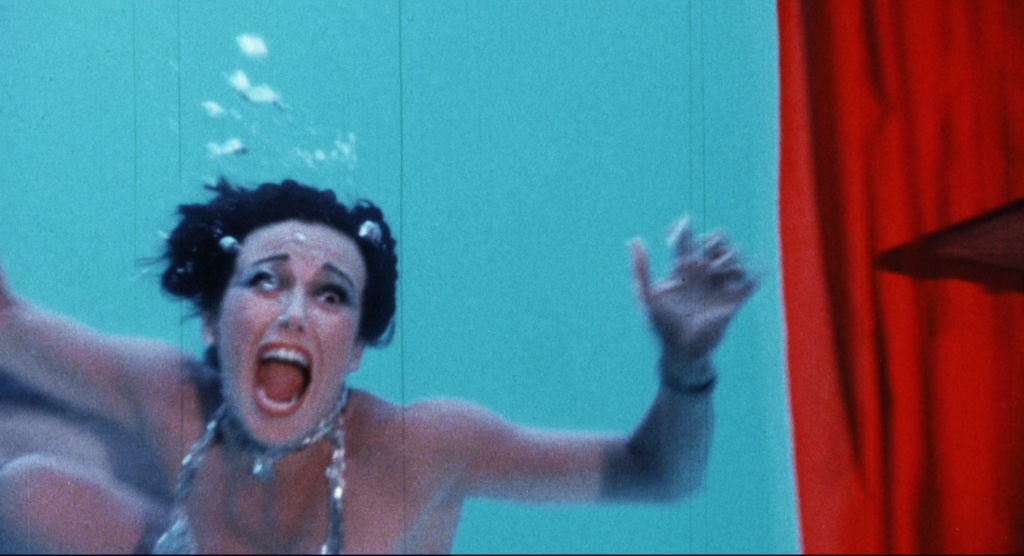
Jennifer Bishop experiences the wrath of Mako: Jaws of Death.
Mako: Jaws of Death (aka The Jaws of Death), as the title implies, was rushed into production to cash in on the success of Jaws (1975), although Grefé says he already had his script ready, awaiting sufficient interest and funding. Indeed, Grefé was accustomed to working with sharks, having wrangled one as far back as Death Curse of Tartu (1966) before coordinating the shark sequence in Live and Let Die (1973), and Mako plays more like a Shark Week take on Willard (or Grefé’s previous Willard riff, 1972’s Stanley) than a Spielberg knock-off. An extremely game Richard Jaeckel (Grizzly) plays Sonny, a loner with a mysterious bond with the sharks he retains on his small island. (Despite the title referencing shortfin mako sharks, these are tiger sharks.) Athletic and single-minded in his protection of the sharks, he’s perfectly willing to murder anyone who would do them harm – or let his sharks do the killing for him. As he eventually reveals to Karen (Jennifer Bishop, Impulse), who swims in an aquarium at a local bar, he swore an oath to protect the creatures after they saved his life from some bandits while he was working as a salvage diver in the Philippines. A monk made him an honorary member of a “shark clan” and gave him a mystical medallion. “As long as I wear my medallion,” he says, “I’ll find friends everywhere among the sharks.”
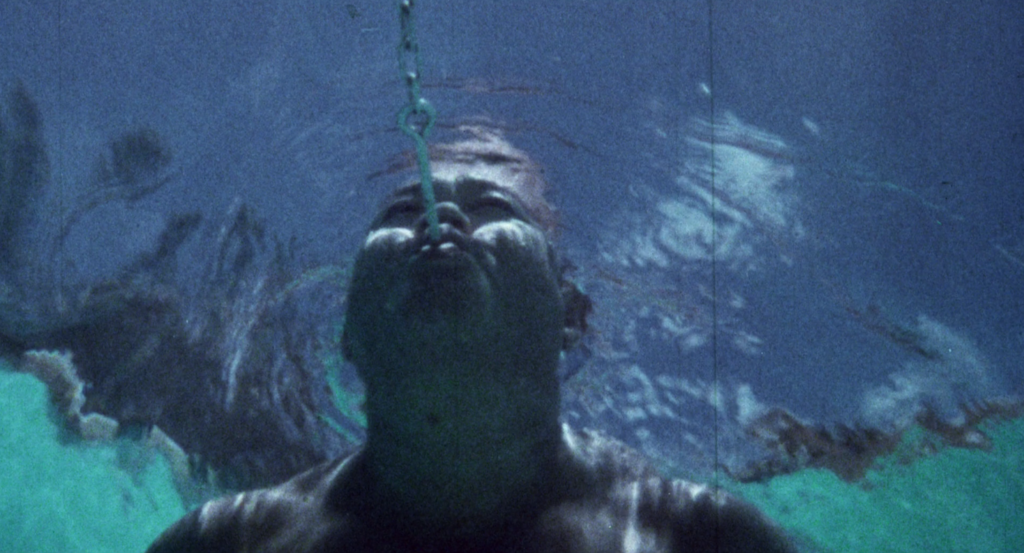
Harold “Odd Job” Sakata gets hooked.
Among the cast are Grefé veterans John Davis Chandler (The Hooked Generation) and Goldfinger‘s iconic Harold “Odd Job” Sakata (as the credits name him, and who had previously appeared in Grefé’s Impulse), both playing sleazy shark hunters. The fishing-themed revenge Sonny takes on the two of them carries the film straight into proto-slasher territory. Sonny, improbably beset on all sides by people who want his sharks, must also contend with a sinister marine biologist as well as the owner of the aquarium bar, “Butter,” played by another Grefé regular, Miami radio personality Milton “Butterball” Smith, who wants to purchase the sharks for his aquatic entertainment. Jaeckel is a lot of fun to watch as he takes his character through desperation and deepening psychosis, and he gets right into the water to swim alongside the sharks. Grefé, as usual, is eager to put his actors next to the animals to capture the most exciting possible footage, here accompanied by gallons of fake blood to simulate frenzied shark attacks. It’s fabulous. Supplements include interviews with Bishop and screenwriter Robert Morgan, a look at sharksploitation films with author Michael Gingold, and the Super-8 condensed version of the film.
And there’s more – He Came from the Swamp also includes a fourth disc with Grefé’s take on Deliverance, Whiskey Mountain (1977), and a feature-length documentary on the filmmaker’s career, They Came from the Swamp (2020). A highly recommended box set from Arrow Video on a unique regional multi-genre filmmaker.
